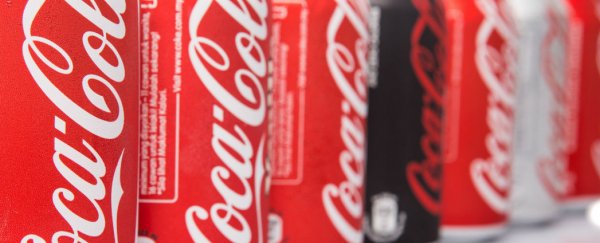Consuming fruit sugar - or fructose - might be giving you more intense cravings for high-calorie foods, which means the more fructose-sweetened soda, fast food, and candy you eat, the more you're going to end up wanting.
A small study by researchers at the University of Southern California in the US wanted to investigate the effects of consuming different types of sugars on a person's hunger levels, so gave 24 healthy volunteers a cup of cherry-flavoured liquid sweetened with glucose on one day, and some days later, gave them a fructose-sweetened drink. Fructose is a type of sugar that's found naturally in fruits and honey, and is a key ingredient in the common and controversial food additive, high-fructose corn syrup (HFCS).
After each drink, the volunteers underwent a functional magnetic resonance imaging (fMRI) session where they were asked to rate their desire to eat something while being shown images of high-calorie foods, such as biscuits, burgers, and pizza, and neutral items, such as bridges and baskets. The participants were not told what was in their drinks at any stage, so as not to skew the results.
The volunteers were also asked to perform a decision task after drinking each type of sweetened liquid, which involved choosing between immediate food rewards and a monetary bonus in a month's time. The levels of glucose, fructose and insulin, plus the enzymes leptin and ghrelin - associated with feelings of hunger or fullness - were also measured in their blood.
The researchers found that when the volunteers consumed the fructose-sweetened liquid, they sustained more activity in the orbital frontal cortex, which is associated with feelings of reward and attention, when shown images of high-calorie foods. They were also more likely to choose the immediate food reward over the delayed monetary reward after having consumed the fructose drink, and reported that their desire to eat was stronger after drinking fructose.
While the researchers found no difference in leptin or ghrelin levels of the volunteers when they drank fructose and glucose, they did find that their plasma insulin response dipped significantly after the fructose drink, which the team says could have an affect what we eat.
"Insulin is released when we consume glucose," one the team, Kathleen A. Page, told Nicholas Bakalar at The New York Times. "The pancreas secretes insulin, and insulin drives glucose into cells so that it can be used for energy. But it also sends a signal to the brain that says 'you've eaten.' Fructose doesn't stimulate insulin secretion, and if there's no insulin, you don't get the information that you're full."
While the results, which have been published in the Proceedings of the National Academy of Sciences, are intriguing, it's no reason to panic and cut high-fructose fruits from your diet altogether, the researchers say. As Priya Tew from the British Dietetic Association, who was not involved in the research, told Michelle Roberts at the BBC, studies like this might not give us a realistic enough picture of whats actually going on.
"Eating fructose and glucose in isolation is very different to eating them within the context of a food where we have other nutrients that interact and can affect digestion," she said. "For example, fructose in fruit is tied up within the cellular structure of that fruit and the fibre content slows down the release of the fructose into the bloodstream. Fruit also has a high water content and takes a while for us to chew and digest so the fructose is not instantly released."
That said, any excuse to cut out junk food, small study or not, has got to be worth taking.
